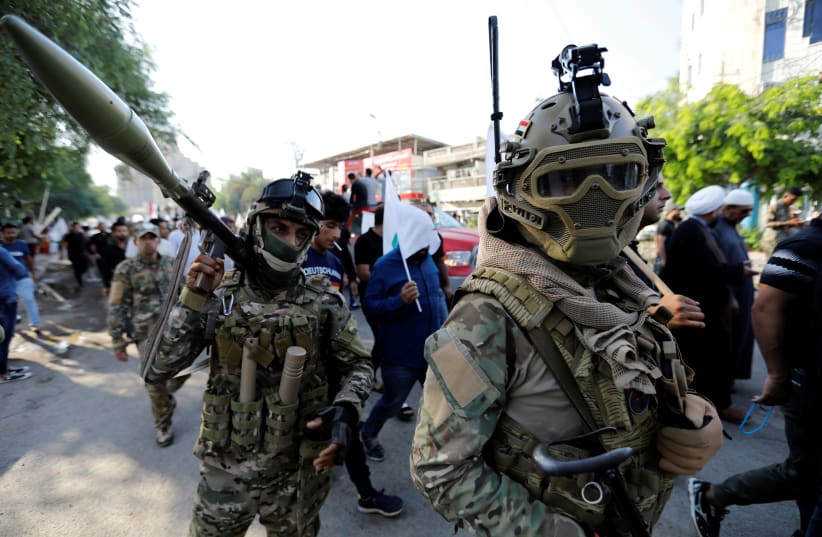On Friday, Wissam Al-alawi, a commander of the Iranian-backed Shi'ite Asa'ib Ahl al-Haq militia, was killed along with his brother by protesters in southern Iraq as they were being evacuated from the area in an ambulance. Video circulated on social media showed demonstrators attempting to remove the two from the ambulance.شاهد.. #العراق : متظاهرون يحاولون رفع العلم العراقي على القنصلية الإيرانية في #كربلاء pic.twitter.com/iGOAx7zXfa
— الحدث (@AlHadath) October 26, 2019
The leader of the powerful Asa'ib Ahl al-Haq (AAH) militia, Qais al-Khazali, said the killing of Alawi is the "the greatest evidence of the project of sedition... and the size of the plot targeting us.""This blood will change the equation," said Hadi al-Amiri, leader of the Badr organization, whose buildings were burnt in some locations in Iraq.Asa'ib Ahl al-Haq primarily targeted US troops in Iraq until the US withdrawal in 2011 and fought alongside Hezbollah in the Second Lebanon War, according to Stanford University's Center for International Security and Cooperation. In 2017, the militia won 14 seats in the Iraqi Parliament.Members of AAH turned their guns on protesters in both Nasiriya and Amara on Friday, leaving scores dead. The militia also clashed with another powerful militia, one loyal to populist cleric Moqtada al-Sadr.Protesters in Baghdad's Tahrir Square chanted slogans against Iran and Qasem Soleimani, the commander of the Iranian Revolutionary Guard Corps' Quds Force, according to Al Arabiya.Muqtada al-Sadr, the head of the Sadr movement in Iraq, warned that if the government didn't resign, Iraq could "slip into civil war."Sadr, a 45-year-old mercurial cleric who presents himself as a man of the people, is backing the ongoing wave of anti-government protests against corruption and economic hardship.The Peace Companies, a militia created by Sadr, took to the streets of Karbala to protect demonstrators on Saturday, according to Al Sumaria news.Sadr's unlikely alliance with communists and secular Iraqis says it fiercely opposes any foreign interference in Iraq, which is strongly backed by both Tehran and Washington.Before Iraq's parliamentary election in 2018, Iran publicly stated it would not allow Sadr’s bloc to govern.Special Representative of the United Nations for Iraq Jeanine Hennis-Plasschaert stated that she was deeply concerned about attempts by "armed entities" to "impede the stability and unity of Iraq and to undermine the right of the people to peaceful assembly and their legitimate demands."The special representative warned that such armed entities "cannot be tolerated," adding that "Iraq has come a long way and cannot afford to slide back into a new cycle of violence."The Hezbollah terrorist movement in Iraq warned that incidents in the renewed protests confirm that "external parties" are working to spread chaos and internal strife.The Iraqi government decided to suspend the operation of Saudi Arabian news channels Al-Arabiya and Al Hadath on Saturday night, under the pretext of lack of a license, according to Al-Arabiya.Reporters for the two agencies were told by Iraqi police to stop any press activity.Iraqi Prime Minister Adel Abdul Mahdi has ordered elite counter-terrorism troops to deploy in the streets of Baghdad and use any means necessary to end protests against his government, two security sources told Reuters on Saturday.Iraq's elite counter-terrorism service also deployed to the southern city of Nasiriya where protesters clashed with security forces on Saturday, breaking up demonstrations by beating and arresting dozens of people.A parliamentary source told Al Sumaria that Mahdi will be questioned in parliament.Clashes between protesters and security forces left 157 people dead and over 6,000 wounded during protests at the beginning of October against government corruption and poor living conditions. The protests had died down since, but were renewed on Friday.Reuters contributed to this report.أيا كانت الجهة التي تقف خلف قتل وسام العلياوي مدير مكتب العصائب في مدينة #العمارة مركز محافظة #ميسان وأخاه، وسواء كانت تصفية حسابات أم بسبب إطلاقهم النار على المتظاهرينإلا أنها خطوة ستجعل أمراء ميليشيات الإجرام الصفوية يعيدون حساباتهم وقد نشهد تصفية حساب تصب بصالح العراقيين! pic.twitter.com/XhQiwAZI9z
— خليل المقداد (@Kalmuqdad) October 26, 2019
